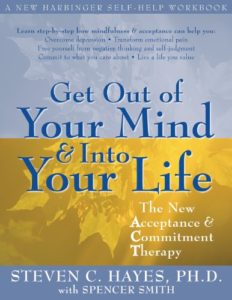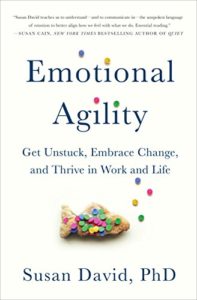Books have always played a key role in how I see the world, with a special emphasis on books that help me see who I am as a person and who I wish to be. But what if you found a book that described YOU – without actually having written it yourself?
That’s what this first book did for me:
 Get Out Of Your Mind and Into Your Life by Steven Hayes
Get Out Of Your Mind and Into Your Life by Steven Hayes
Published by New Harbinger Publications on 11/1/2005
Genres: Nonfiction
Get Out Of Your Mind and Into Your Life is a book I discovered about six years ago that took my breath away. It was like reading about myself: like something had gone into my brain and gathered all the random thoughts in my head,made sense of them, then wrote them out in book form. This book gave me the gift of verbalizing how I try to live my life -and then showing me what I hadn’t thought of trying yet. It changed the course of my coach training and opened up a new network of friends and mentors. It’s hard to not sound like I’m gushing because I can’t talk about this book without going on and on for hours.
The second book I want to mention is Emotional Agility  Emotional Agility by Susan David
Emotional Agility by Susan David
Published by Avery on 09/06/2016
Genres: Nonfiction
. While this book didn’t redirect my life, it deepened what I already learned.
The common thread in these books is that they share the same existential-humanistic approach found in Acceptance and Commitment Therapy (or ACT for short). Don’t let the word therapy deter you: it’s simply due to the fact that this philosophy for living is grounded in evidence based science and research and comes out of a cognitive behavior therapy framework. I will be discussing more about this model in almost all of my posts so I wanted to introduce the books here.
Humans and their ability to use language have always fascinated me. I grew up when Koko the gorilla was gaining in popularity (can you imagine if she had a Instagram account back then). I was also an exchange student to Germany in high school and the language barrier (or key, depending upon my German skills) always struck me as powerfully human. The fact that I can type out these words and have you understand them is something no other species on the planet can do.
ACT comes from a very detailed model called Relational Frame Theory which explains how humans are able to transform sounds from their mouths and scratches on paper into communication with another. I am not even going to try and sum that up here, but I want to point out that ACT comes from the scientific model of the thing that strikes awe in me the most – the human ability to speak and convey.
With this power of language, we really know how to mess ourselves up. We make meaning out of the meaningless and completely ignore the significant moments in our lives. When I use the techniques that are spelled out in ACT, it untangles the thoughts in my head to allow me to be present – and appreciate – the life I have.
What would you do if you found a book that so closely resembled how you think? Would you laugh or cry? I think I did both. While there are certainly books that I remember fondly from childhood that opened my eyes to other worlds – A Wrinkle In Time, The Green Futures of Tycho – this was like looking both backwards and forwards in time.
You can learn more about Acceptance and Commitment Therapy and see if it fits your worldview as well. Here’s a video explaining ACT (pronounced ACT, not Aye-See-Tee) from one of the co-founders, Dr Steven Hayes:



